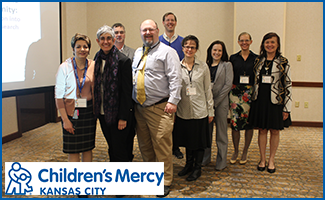
Autism is a common neurodevelopmental disorder that presents across a spectrum of abnormalities and a complex set of genetic causes. Both genetic and environmental factors may contribute to the disorder. Most genetic findings have been focused on the sequence of genes that code for proteins, but we now know that noncoding DNA sequences may also contribute to autism.

Autism is a common neurodevelopmental disorder that presents across a spectrum of abnormalities and a complex set of genetic causes. Both genetic and environmental factors may contribute to the disorder. Most genetic findings have been focused on the sequence of genes that code for proteins, but we now know that noncoding DNA sequences may also contribute to autism.
Zohreh Talebizadeh, PhD is an Associate Professor of Pediatrics at UMKC’s School of Medicine and directs the Autism and Neurodevelopmental Disorders Genetics Research Laboratory at Children’s Mercy Kansas City. Her research interests focus on genetic and epigenetic factors underlying autism using integrated approaches (linking genomic and phenotypic data). Her work on expression profiling of microRNAs was one of the first reports on the role of these regulatory factors in autism. Her novel multi-step subject stratification approach to address differences within and between families in autism has been highlighted by the autism research community.
“When I began working on autism, more than 15 years ago, I quickly realized that to fully understand the causes of this complex condition, we need to identify different subtypes of autism that share specific features and explore the role of factors that regulate expression of genes (beyond just coding regions).” She recalls: “Connecting multiple pieces of genomic and phenotypic data, an essential component of translational research, requires integrated approaches. Over time these themes have become integral parts of my research and motivated me to always think outside the box.” She added “After working in silos for many years, it is exciting to see a growing interest in our region for collaborative research around these topics. The availability of unique resources and skills has created a rich environment for researchers like myself to develop collaborative programs focused on autism.” Dr. Talebizadeh plays a leadership role in the Neurodevelopmental Working Group organized by KCALSI as part of their Path to 2025 plan. Currently, she leads a number of projects, including:
1. microRNA profiling in a gene environment interaction model (prenatal stress exposure and maternal genetic risk factors), in collaboration with Dr. David Beversdorf, MU.
2. Alternative splicing pattern in circadian genes, in collaboration with Dr. Luciano DiTacchio, KUMC.
3. Autism and obesity: co-occurring conditions or drug side effects?
“The thinking outside the box notion has taught me that sometimes, as a researcher, I should step out of my comfort zone and apply my expertise on unconventional approaches. In the past 3 years, I’ve devoted efforts to learn about health outcomes research and find ways to make a bridge between genetics and outcomes research, hoping to contribute to improving translational aspects of autism genetics research” She added.
 Dr. Talebizadeh leads a Patient Centered Outcomes Research Institute funded initiative called Autism Genetics and Outcomes (AutGO), that promotes partnerships between genetics and outcomes researchers, leading to designing research projects that utilize data and principles from both disciplines (see the paper describing this initiative). She organized a workshop on this topic in April 2017 in Kansas City, and invited a number of local leaders, parents/patient advocates, and representatives from the autism research community (see workshop details here). The AutGO project, in collaboration with contributors from George Washington University, the Kennedy Kruger Institute in Baltimore, and the University of Pennsylvania, involves investigators from a number of Midwest institutions, including:
Dr. Talebizadeh leads a Patient Centered Outcomes Research Institute funded initiative called Autism Genetics and Outcomes (AutGO), that promotes partnerships between genetics and outcomes researchers, leading to designing research projects that utilize data and principles from both disciplines (see the paper describing this initiative). She organized a workshop on this topic in April 2017 in Kansas City, and invited a number of local leaders, parents/patient advocates, and representatives from the autism research community (see workshop details here). The AutGO project, in collaboration with contributors from George Washington University, the Kennedy Kruger Institute in Baltimore, and the University of Pennsylvania, involves investigators from a number of Midwest institutions, including:
• Children’s Mercy Kansas City
• University of Missouri Kansas City
• University of Kansas Medical Center
• University of Kansas
• University of Missouri in Columbia
• University of Nebraska Medical Center
• Creighton University
• The University of Iowa
• Washington University in St. Louis
“We are hoping that the AutGO initiative provides a platform to foster collaboration among Midwest scientists interested in studying autism and neurodevelopmental disorders”, Dr. Talebizadeh said.